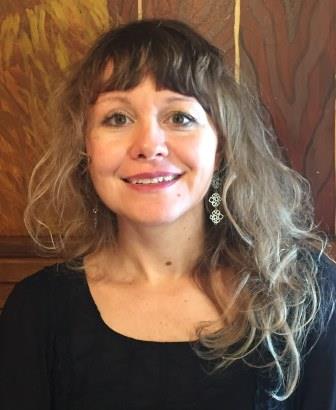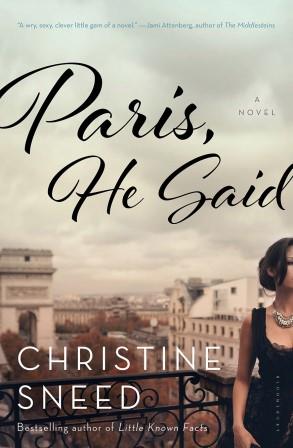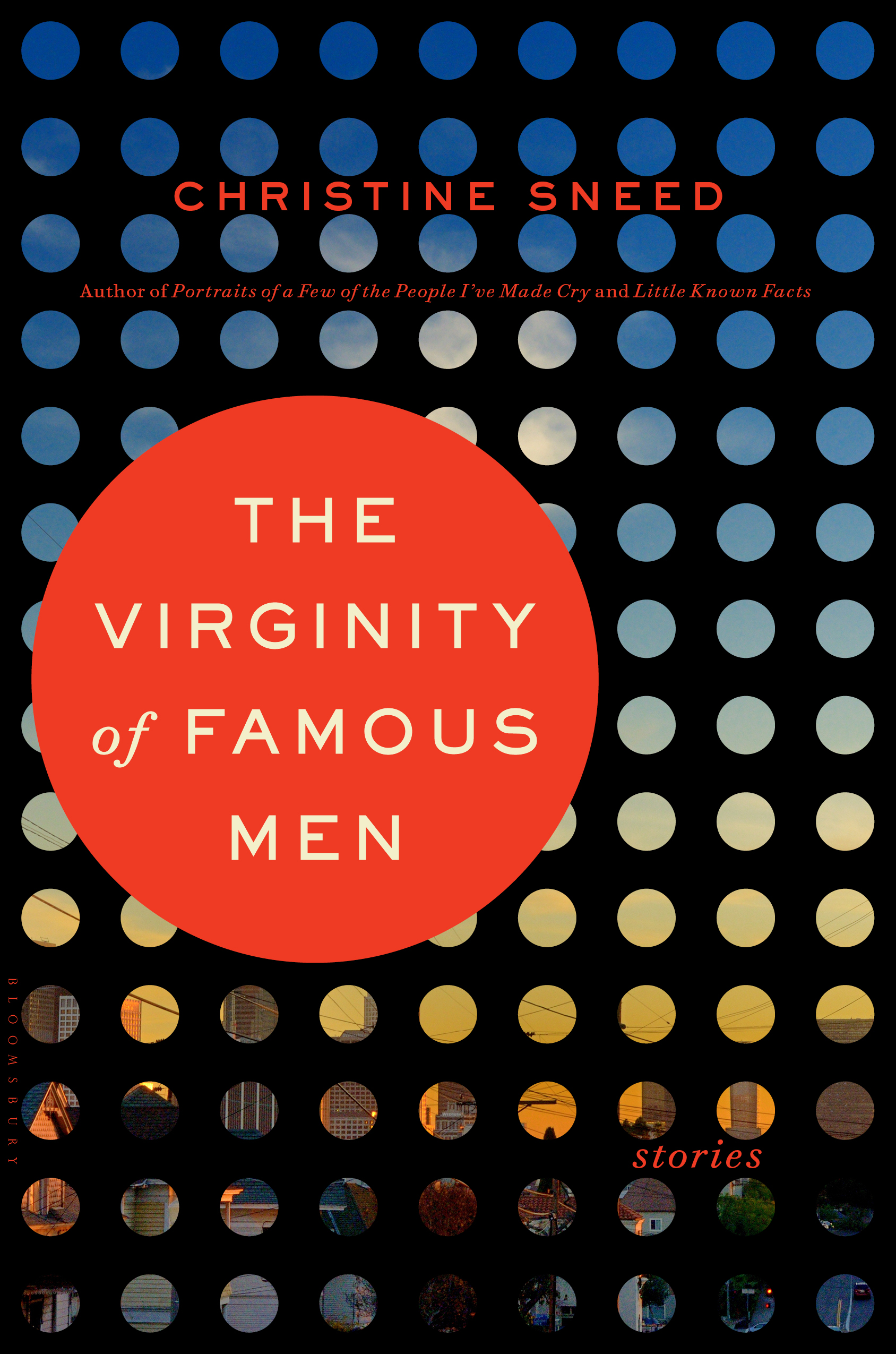 We last talked with author Christine Sneed back in early 2011 shortly after she published her first short story collection Portraits of A Few of the People I’ve Made Cry. Already the winner of the Grace Paley Prize in Short Fiction, her stunning debut became a magnet for literary awards and was eventually named a finalist for the LA Times’ Book Prize for First Fiction. But Sneed was just getting started. In the years that followed, the NU writing teacher has published two critically-acclaimed novels – Little Known Facts (2013) and Paris, He Said (2015), graced the cover of the NY Times Book Review, and continued to collect writing honors including the Carl Sandburg 21st Century Award and a Booklist nod for a Top Ten Debut Novel. This Saturday, April 9th, you can hear Sneed read selections from her recent work when she visits EPL’s 1st Floor Community Meeting Room at 4 pm along with author and comedienne Julia Sweeney. In anticipation of her visit, we recently spoke with her via email about the life of a successful novelist, her forthcoming story collection The Virginity of Famous Men, the resurgence of short fiction, and her favorite recent reads.
We last talked with author Christine Sneed back in early 2011 shortly after she published her first short story collection Portraits of A Few of the People I’ve Made Cry. Already the winner of the Grace Paley Prize in Short Fiction, her stunning debut became a magnet for literary awards and was eventually named a finalist for the LA Times’ Book Prize for First Fiction. But Sneed was just getting started. In the years that followed, the NU writing teacher has published two critically-acclaimed novels – Little Known Facts (2013) and Paris, He Said (2015), graced the cover of the NY Times Book Review, and continued to collect writing honors including the Carl Sandburg 21st Century Award and a Booklist nod for a Top Ten Debut Novel. This Saturday, April 9th, you can hear Sneed read selections from her recent work when she visits EPL’s 1st Floor Community Meeting Room at 4 pm along with author and comedienne Julia Sweeney. In anticipation of her visit, we recently spoke with her via email about the life of a successful novelist, her forthcoming story collection The Virginity of Famous Men, the resurgence of short fiction, and her favorite recent reads.
Evanston Public Library: Can you reflect a little on the success you’ve enjoyed since we first talked 5 years ago? Is the life of a novelist at all what you expected? How has your creative process evolved since Portraits, and what have you learned about the business side of the writing life?
Christine Sneed: I’ve been very grateful for the good reviews, my excellent publisher, Bloomsbury, and my editor, Nancy Miller, especially. The awards have surprised me and kept me going too when things felt overwhelming. I’ve been teaching full-time while also writing as often and as much as I can; I need to figure out how to balance leisure better with work, however, for my sanity, and for my partner Adam’s! Financially, the rewards haven’t been quite what I’d hoped, but I keep working. One thing I’ve realized over the past six years is how incredibly difficult it is to sell books. All the events, the hard work by publicists, and review coverage don’t always equate to robust sales, as many authors could also tell you. I wrote about this aspect of the writing life in an essay published last June on The Billfold. The work is the real reward, as it has been from day one. I love writing; if I didn’t, I’d have found another way to make a living by now.
 EPL: Paris, He Said – which is out now in paperback – was first published last May, and by now you’ve spent a great deal of time with the main characters Jayne and Laurent. Has your understanding of them changed at all since they were first conceived? Have you gained any new insight into their relationship after a year of sharing the novel with readers?
EPL: Paris, He Said – which is out now in paperback – was first published last May, and by now you’ve spent a great deal of time with the main characters Jayne and Laurent. Has your understanding of them changed at all since they were first conceived? Have you gained any new insight into their relationship after a year of sharing the novel with readers?
CS: One thing that has been a pleasure to witness is that readers who might have initially thought the novel would be a conventional romance, have been happy (I think) that the book is more about the challenges of the life of a working artist, which include learning to accept one’s ambition and desire for notoriety and financial rewards. Jayne feels conflicted about the fact that she wants to be a successful artist, and worries that her gallery-owner benefactor and lover Laurent will think she’s with him solely to get ahead professionally, but he doesn’t think she’s a gold digger, nor does he think she should be coy about accepting whatever help he can offer her as an artist. I have been happy that, on the whole, readers seem to understand and like both characters. I like them too, though I suppose it’s no shock that I have liked them from the beginning.
EPL: Your new story collection The Virginity of Famous Men is out in September. Can you tell us about its journey to publication? Do you think of this collection as a “return to short stories,” or are you always writing in that form? Does the title indicate a common theme in the collection, or is it just a great title?
CS: This story collection was almost finished in July 2013 when it sold to Bloomsbury as part of Paris, He Said’s book deal. I was so thrilled to have sold it – more so than I was about Paris, He Said, to be candid, which at the time was only partially done; my editor acquired it based on the first 100 pages. Short stories are probably my first love as both reader and writer, so it’s a thrill to have this book out in the fall; it’s the one I feel most excited about of the four books I’ve published, maybe because I love the story form? Well, also because I’m so pleased to have been able to publish four books and with a press I admire.
The title isn’t an all-encompassing theme, though it is the title of the final story and fame does have something to do with a few of the stories in the book.
 EPL: The story “The First Wife” from Virginity explores the effects of celebrity and fame in ways similar to your novel Little Known Facts. Did one story inspire the other? How have your ideas about fame evolved now that you’ve achieved a certain amount of celebrity yourself?
EPL: The story “The First Wife” from Virginity explores the effects of celebrity and fame in ways similar to your novel Little Known Facts. Did one story inspire the other? How have your ideas about fame evolved now that you’ve achieved a certain amount of celebrity yourself?
CS: Little Known Facts was written a couple of years after I finished the “The First Wife” and you know, I wasn’t thinking about the short story as I was writing LKF. I’ve written quite a few short stories about people in Hollywood; it’s long been a subject that I find inspiring. Americans’ feelings about celebrity are complex and offer very good material for writers and artists, I think.
You’re kind to say that I’ve achieved some celebrity; I don’t think that’s true though! I do know a lot of people who love to read, but as a national pastime, I’d say that reading ranks very low. I’ve never had a bestseller, so I don’t think that many readers of literary fiction know my work, but I’ll keep trying.
EPL: Your story “The New, All-True CV” is really funny and shows off your knack for comedic writing. What inspired this story, and how did you conceive its unique form? Can we look forward to more humorous stories from you in the future?
CS: I love comic stories and if I can pull one off, I’m always happy about this. There are a few other stories written in a humorous vein in The Virginity of Famous Men to go with the much more serious ones. I’m not sure what inspired “All-True CV” – I think I was contemplating how we try to put our best face forward in job interviews but our real character is ultimately what determines suitability for a job, though no one who actually hopes to get the job dares to be too honest in a job interview.
EPL: Back in 2011, we discussed the health of the short story as it was being vigorously debated in essays by Stephen King and A.O. Scott. Five years later and with Virginity out in September, what is your opinion on the state of the art form? Has it found a healthy place in the world of blogs and tweets?
CS: Short story writer Alice Munro’s 2013 Nobel Prize in Literature, the story collections that won the last two National Book Awards in Fiction – Phil Klay’s Redeployment (2014) and Adam Johnson’s Fortune Smiles (2015) – and the commercial success of George Saunders’ collections, especially Tenth of December, have all signaled to the New York publishing world, as well as readers, that the short story form is a truly rewarding one that should be taken as seriously as the novel.
 The annual Best American Short Stories and O. Henry Prize Stories anthologies also sell well, so I do think the short story is holding its own, though individually, I do think a lot of readers have to be coaxed into buying story collections or checking them out from the library. My forthcoming collection is the same length as my two novels though; there’s a lot in there, and in each story I attempt to create as complex and emotionally resonant a world as in the novels I’ve written.
The annual Best American Short Stories and O. Henry Prize Stories anthologies also sell well, so I do think the short story is holding its own, though individually, I do think a lot of readers have to be coaxed into buying story collections or checking them out from the library. My forthcoming collection is the same length as my two novels though; there’s a lot in there, and in each story I attempt to create as complex and emotionally resonant a world as in the novels I’ve written.
EPL: When you visit EPL on April 9th, you’ll be joined by author and comedienne Julia Sweeney. How did the two of you become acquainted? What makes your reading partnership work so well?
CS: We met at the Chicago Public Library Foundation’s 2013 Carl Sandburg Awards banquet. Soon after that, Julia read my second book, Little Known Facts, and we started to correspond, and in turn, I read her second book, If It’s Not One Thing, It’s Your Mother, and loved it. Julia’s a wonderful writer and performer. It’s very easy to talk with her; I think she can dazzle just about anyone with her wit and intelligence.
EPL: Can you recommend any books you’ve read lately? Since you’re also a published poet, can you share one or two of your favorite poems in celebration of National Poetry Month?
CS: I really enjoyed Karin Lin-Greenberg’s Flannery O’Connor Award-winning story collection Faulty Predictions, and Lori Ostlund’s novel After the Parade. Also, Karen Bender’s story collection (and 2015 National Book Award finalist!) Refund.
Here’s a poem by Barry Goldensohn that I love:
Great Horned Owl
On a dawn walk I startled
a great horned owl, wary,
near, on a low limb
of a tree downhill from me.
Those slow wings opened,
broad as a man, two men,
and he sank fast down
into the hillside in blank
silence, a wall toppling
its whole enormous length
that does not touch a thing.
Another poet whose work I admire so much is Gregory Fraser; he has three collections out, two of them with Northwestern University Press: Answering the Ruins and Designed for Flight. His first collection, Strange Pietà, was published with Texas Tech University Press.
Interview by Russell J.
